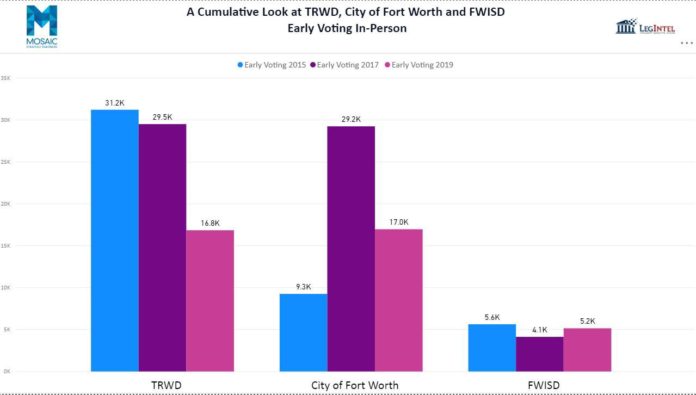Looking to vote Saturday in Tarrant Co.?
www.tarrantcounty.com/en/elections.html
Parker Co. www.parkercountytx.com/118/Elections
Johnson Co. http://www.johnsoncountytx.org/departments/elections-office
In an election year marked by competitive races for Fort Worth mayor, City Council and school board seats, as well as two seats on the Tarrant Regional Water District, voters seemed to shrug their shoulders during early voting.
Only 4.4 percent of the more than 1.1 million registered voters turned out to cast early ballots in the municipal, school board and special districts across Tarrant County, including Fort Worth, Arlington and the many other smaller communities.
A total of 49,134 early ballots were cast countywide in early voting, which ended on April 30, according to the Tarrant County Elections office.
Early votes cast this year were slightly ahead of the May 2017 election, when 48,478 people voted early.
Elections with marquee races drew the highest share of early votes this year but mostly lagged behind early turnout two years ago.
An early voting analysis conducted by the political strategy and communications firm, Mosaic Strategy Partners, shows that 12,000 fewer early votes were cast this year compared to 2017 in city of Fort Worth races. However, the 17,000 early votes cast were about 8,000 above early voting turnout in 2015.
In the TRWD board race, turnout this year was dramatically down from 2017, when 29,500 early votes were cast and 2015, when more than 31,000 early voters participated. Only 16,800 early votes were cast this year.
Early voters cast 5,200 ballots in the Fort Worth ISD board race this year, up from 4,100 in 2017 and nearly even with the 5,600 early votes cast in 2015. FWISD seats are all elected by district.
Former State Rep. Lon Burnam, a Fort Worth Democrat, has been working diligently to increase voter registration and participation in local elections through the non-partisan May 4 Coalition.
“I’m not panicking but I’m disappointed (in early voting turnout) given the effort to increase voting in local elections,” said Burnam, “The North Texas region has one of the lowest voter participation rates of any major metro area in the U.S.”
Tom Stallings, a principal in Mosaic Strategy Partners, said the early voting turnout picked up momentum in the final days, which could be an indication that voters are becoming energized and will turn out in larger numbers on election day on Saturday.
Turnout in May local elections hovered in the 8 to 9 percent range countywide for the past few election cycles.
The citywide Fort Worth mayor’s race had a turnout of 8.29 percent in 2017 while individual district races ranged from a low of 5.65 percent to a high of 14.7 percent.
The individual district races in the Fort Worth ISD school board races had turnout ranging from about 11 to12 percent.
Turnout in the district-wide race for the Tarrant Regional Water District board was 8.62 percent in 2017.
Some political observers speculated that this year’s local elections, following on the heels of the extraordinary turnout in the 2018 midterms, could be a litmus test for voter engagement or a singular occurrence tied to Democratic enthusiasm for former Congressman Beto O’Rourke’s campaign to oust U.S. Sen. Ted Cruz.
O’Rourke lost but managed to close the gap to less than 3 percent, the slimmest margin between a Democrat and Republican in 24 years. O’Rourke carried Tarrant County by a margin of less than 1 percent.
“We had a 180 percent increase in turnout in 2018 compared to 2014,” Burnam said.
But in this local election, voters have retreated to typical patterns, showing limited interest in the marquee Fort Worth mayor’s race or the competitive race for two open seats on the TRWD board that is viewed by some as a referendum on the future of the Panther Island project.
Although all the local races are nonpartisan, the Fort Worth mayor’s race has partisan implications and could be a bellwether of a political shift from deep red to purple.
Betsy Price is seeking a fifth term as mayor. Deborah Peoples, who is chair of the Tarrant County Democratic Party, is her top challenger.
Price, who formerly served as Tarrant County Tax Assessor-Collector, was elected as a Republican to that position.
Voters tend to not focus on complex or partisan issues in local races, instead preferring to concentrate on matters that directly impact them.
“Things like ‘Is my sewer system working, are the streets safe, do we have good lighting in neighborhoods,’” Texas Christian University political science professor James Riddlesperger has said.
One problem that appears to be absent from this year’s local elections is vote harvesting, a form of voter fraud achieved through elicit mail-in ballot activity.
Before the start of early voting for the midterms, four women in Tarrant County were indicted on 30 felony counts of voter fraud in connection with vote harvesting in 2016, according to Texas Attorney General Ken Paxton.
The women were part of an organized ring that preyed on elderly voters in some Northside neighborhoods. The goal of the ring was to generate large numbers of mail-in ballots and then coax voters to cast votes that would benefit the election of specific candidates, Paxton said.
“Seeing people being indicted and convicted may be keeping harvesters away,” Burnam said.






